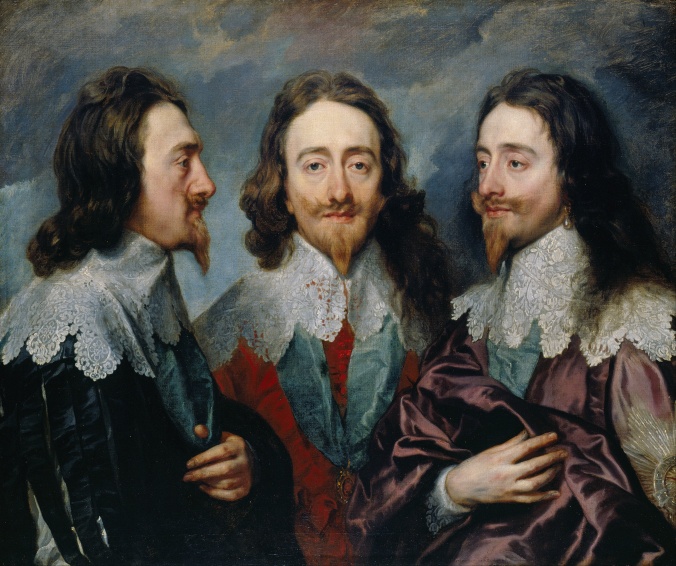I have always loved the history of the English Civil Wars, and I have found that I also am addicted to the period’s literature (naturally). The Cavalier Poets stand out for me; a coterie of highly virile men keen on demonstrating their masculine prowess, but also a fervent love for King (the rather melancholy man pictured above) and Country. In amongst the lust and inherent sassiness lies a strong political orientation, and some of their most moving poetry comes from their writing about the Civil War and in defence of Charles I.
1) “I have my freedom in my love, and in my soul am free; angels alone, that soar, above, enjoy such liberty”. From ‘To Althea, from Prison’, Richard Lovelace. Wow. An absolutely gorgeous few lines, beautiful in isolation as well as within the poem. Here the poet laments his incarceration, but in doing so realises that there is more than just physical freedom. So long as he loves (his king, Althea, God – all are possible love-objects here), he can never be in chains.
2) “Thy gates have been made only to let strangers in; untaught to shut, they do not fear to stand wide open all the year”. From ‘To Saxham’, Thomas Carew. In the midst of winter, Carew (pronounced ‘Carey’ – isn’t the English language fantastic and confounding?!) paints a picture of the hospitable estate of Saxham. Typical of country-house, or estate, poetry, the building here is personified (elsewhere in the poem it is described as an ark), and physically welcomes in the freezing poor to give alms. No one has taught them to close – they are subservient to and reflect the traits of their charitable master.
3) “Aurora throws her fair fresh-quilted colours through the air”. From ‘Corinna’s Going A-Maying’, Robert Herrick. I love the poem to bits, and it was hard for me to pick out a quote to analyse here. I chose this one because it is a wonderful reflection of the pastoral elements of the poem – as a country-girl myself, I love any mention of fields and seasons and the times of day, especially the morning (much to the consternation of many of my friends!). The dawn (Aurora, the Roman goddess) is friendly and comforting here, like a quilt over the fields and hills, warming the land and promising rejuvenation and freshness. This line captures perfectly a still moment of the otherwise hasty carpe diem poem.
4) “Tis not the meat, but tis appetite makes eating such delight”. From ‘Sonnet II: Of thee, kind boy, I ask no red and white’, John Suckling. Other than making a very credible statement about eating, Suckling makes a far greater point about attraction between people. In the beginning of this poem he discredits the idea of beauty, and here explains that he desires someone (the meat), not because of anything intrinsic to themselves, but because he has the desire (appetite) in the first place. This draws on the image of love as food and nourishment that I have mentioned before in my post on Donne and Shakespeare’s sonnets, and gives some idea of the voracious nature of human desire, as well as being fairly comedic.
5) “I write of Hell; I sing (and ever shall) of Heaven, and hope to have it after all”. From ‘The Argument of His Book’, Robert Herrick. Yes, Herrick made it into the top five twice, he is quite a poet. Again, I could quote this whole poem, with its talk of idyllic groves and flowers and the summer months, but I chose the last lines as after all the perfect beauty comes the jarring mention of hell. It is impossible for him to not write about it because in some ways there is no escaping the hellish nature of human beings, and of course the literal hell in the minds of many Christians during this period. Even so, he immediately undercuts it by singing, not merely writing, about his hopes of heaven, and with that undying positivity he closes the poem.
